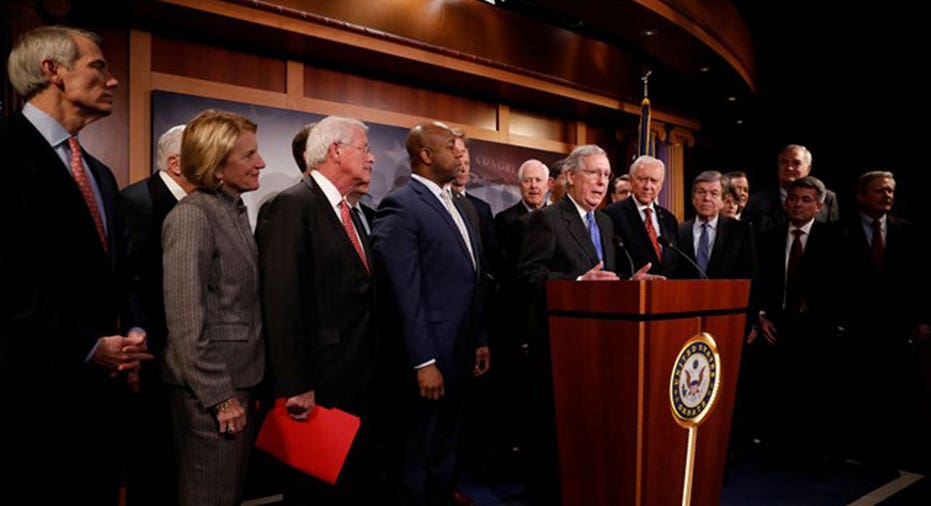Trump, GOP plan White House celebration as tax bill OK nears

Jubilant Republican lawmakers laid plans to join President Donald Trump at the White House for a victory celebration Wednesday as Congress moved one roll call away from approving the GOP’s paramount priority, the most thorough reshaping of the country’s tax system since the 1980s.
“Workers benefit. Wages go up. More jobs occur,” House Speaker Paul Ryan, R-Wis., said Wednesday on NBC’s “Today,” describing what Republicans say will flow from a $1.5 trillion measure that affects everyone’s taxes but is dominated by breaks for business and higher earners. Democrats call the legislation a boon to the rich that leaves middle-class and working Americans behind.
“If they think this bill is a good political argument for them, let them think that,” House Minority Leader Nancy Pelosi, D-Calif., told reporters.
The Senate used a post-midnight vote to approve the measure on a party-line 51-48 tally. Protesters interrupted with chants of, “Kill the bill, don’t kill us” and Vice President Mike Pence repeatedly called for order. Upon passage, Republicans cheered, with Treasury Secretary Steve Mnuchin among them.
Senate Majority Leader Mitch McConnell, R-Ky., insisted Americans would respond positively to the tax bill.
“If we can’t sell this to the American people, we ought to go into another line of work,” he said.
Trump planned a ceremony with GOP lawmakers Wednesday after final congressional approval.
In an eleventh-hour hiccup Tuesday, the Senate parliamentarian found that three minor provisions violated Senate rules, forcing lawmakers to strip them out.
Republicans had rammed the bill through the House 227-203 on Tuesday with all voting Democrats in opposition. Because of the language the Senate removed, the House had to revisit the measure Wednesday because each chamber must approve identical legislation before it can be signed into law.
Ryan, who has worked years toward the goal of revamping the tax code, gleefully pounded the gavel on Tuesday’s House vote. GOP House members roared and applauded as they passed a package that will touch every American taxpayer and every corner of the U.S. economy, providing steep tax cuts for businesses and the wealthy, and more modest help for middle- and low-income families.
Despite Republican talk of spending discipline, the bill is projected to push the huge national debt ever higher.
Ryan said Wednesday the GOP is willing to risk running up deficits with the aim of getting a higher annual economic growth rate.
Trump is aching for a big political victory after 11 months of legislative failures and nonstarters. The president tweeted his congratulations to GOP leaders and to “all great House Republicans who voted in favor of cutting your taxes!”
Congressional Republicans, who faltered badly in trying to dismantle Barack Obama’s Affordable Care Act, see passage of the tax bill as crucial to proving to Americans they can govern — and imperative for holding onto House and Senate majorities in next year’s midterm elections.
“The proof will be in the paychecks,” Sen. Rob Portman, R-Ohio, said during the Senate’s nighttime debate. “This is real tax relief, and it’s needed.”
Not so, said the top Senate Democrat as the long, late hours led to testy moments Tuesday night.
“We believe you are messing up America,” New York Sen. Chuck Schumer told Republicans, chiding them for not listening to his remarks.
The GOP has repeatedly argued the bill will spur economic growth as corporations, flush with cash, increase wages and hire more workers. But many voters in surveys see the legislation as a boost to the wealthy, such as Trump and his family, and a minor gain at best for the middle class.
Democrats mocked the Republicans’ contention that the bill will make taxes so simple that millions can file their returns “on a postcard” — an idea repeated often by the president.
“What happened to the postcard? We’re going to have to carry around a billboard for tax simplification,” declared Rep. Richard Neal of Massachusetts, the top Democrat on the Ways and Means Committee.
Tax cuts for corporations would be permanent while the cuts for individuals would expire in 2026 to comply with Senate budget rules. The tax cuts would take effect in January, and workers would start to see changes in the amount of taxes withheld from their paychecks in February.
The bill would slash the corporate income tax rate from 35 percent to 21 percent. The top tax rate for well-off individuals would be lowered from 39.6 percent to 37 percent.
The legislation repeals an important part of the 2010 health care law — the requirement that all Americans carry health insurance or face a penalty — as the GOP looks to unravel the law it failed to repeal and replace this past summer. It also allows oil drilling in the Arctic National Wildlife Refuge.
The $1,000-per-child tax credit doubles to $2,000, with up to $1,400 available in IRS refunds for families that owe little or no taxes.
Disgruntled Republican lawmakers from high-tax New York, New Jersey and California receded into the background as the tax train rolled. They oppose a new $10,000 limit on the deduction for state and local taxes.
The bill is projected to add $1.46 trillion to the nation’s debt over a decade. GOP lawmakers say they expect a future Congress to continue the tax cuts so they won’t expire. That would drive up deficits even further.



















